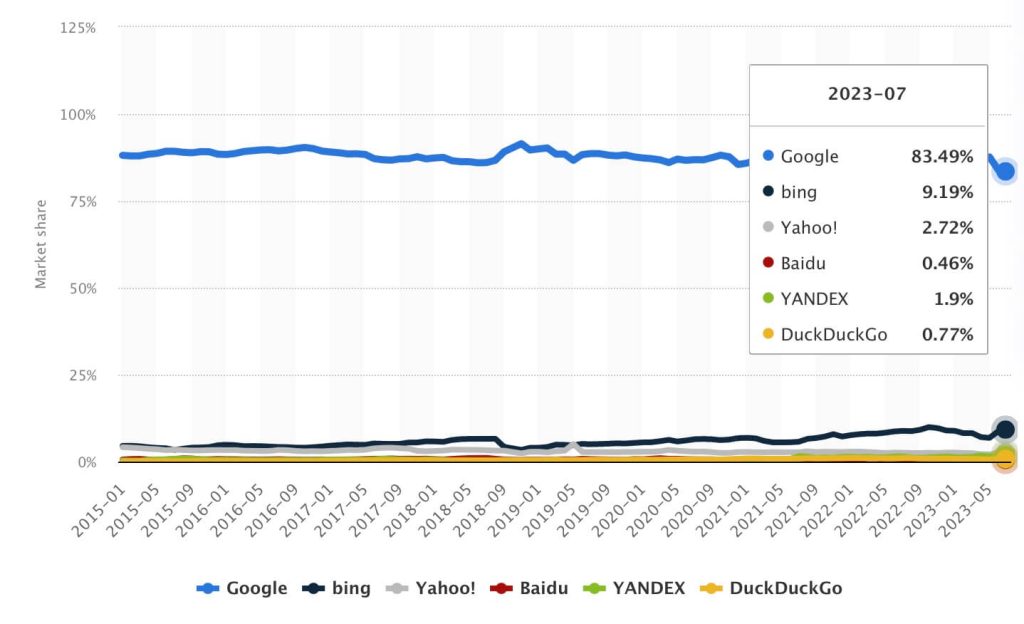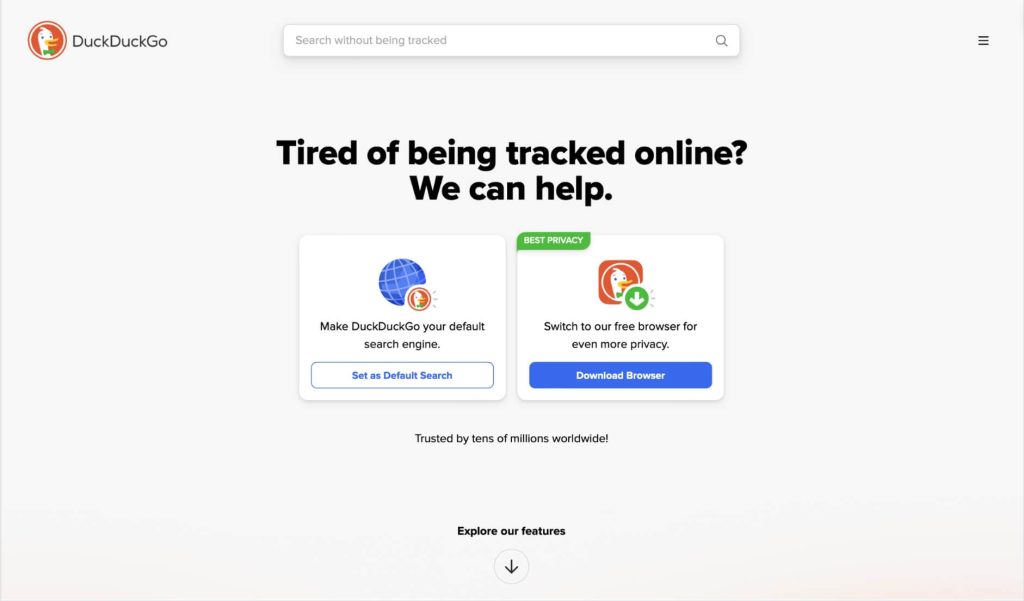
If you are an Internet user, you surely know what a search engine is and why it is used. Google, Bing, Yahoo, etc. are all search engines.
I would argue that every one of us who uses the Internet uses some search engine – at work and in our free time. You use them to search for information and they try to provide you the best possible answer based on what you are looking for.
Since there are actually more of them than we can count on our fingers, we will go through the less popular and most famous search engines in this article, starting from the latter.
What are the Top 5 Search Engines in the World?
Top 5 most popular search engines in the world, based on the market share according to Statista are:
- Google – 83.49%
- Bing – 9.19%
- Yahoo – 2.72%
- Yandex – 1.9%
- DuckDuckGo – 0.77%

Although these five are the most popular search engines, you may not be familiar with all of them. Popularity depends a lot on one’s location, for example Google is the most famous in Finland, while Baidu is in China.
1. Google

Google is a search engine that has been the biggest and most popular of them all for decades. In 2022, Google’s market share in smartphones was 96%. When we search for something on the Internet, we even use the term “Googling” even if we are not using that search engine at the time.
Known for their complexity, Google’s algorithms play a crucial role in producing accurate search results – they help us find what we’re looking for. But Google is more than just a search engine; it’s designed to be user-friendly, with features like personalized recommendations to make our online experience smoother. The fascinating thing is that Google doesn’t just find information, it shapes the information we encounter.
It’s also an important factor for websites – Google’s rules and guidelines affect how websites use SEO to make them more visible and accessible to users looking for specific content.
2. Bing

Bing is a Microsoft search engine with a range of features and a user-friendly interface designed to simplify your search experience.
Compared to Google, Bing offers a clear approach to search results and design, offering an alternative perspective on the world of search engines.
What sets Bing apart are its unique features, such as daily changing backgrounds that add aesthetic appeal and a focus on visual search, allowing users to search using images. It’s Microsoft’s contribution to making web searches more visually interesting and user-centric.
3. Yahoo

Yahoo‘s history is the longest among search engines. In the early days, Yahoo was one of the most popular places to explore the Internet and search for information. Yahoo still has the features that make it stand out in the search engine world.
Although it may not be as flashy as many newcomers, Yahoo is still relevant and offers a reliable option for those looking for information online.
4. Yandex

Yandex is like a Russian search engine that helps people find what they need online. It is the search engine for many Russians, but it has its own way of doing things. Yandex not only looks at what you are looking for, but also estimates where you are. It tailors results based on your location, making it convenient for searching for local services.
So if you find yourself in Russia’s vast digital landscape, Yandex is your guide to finding what you’re looking for right near you. In Western countries, it is often known as a censored search engine, in which case the search results may differ a lot from, for example, Google.
5. DuckDuckGo

DuckDuckGo is known for its commitment to user privacy and protecting searches. It offers a safe user experience from the personalized ads and data tracking that characterizes many mainstream search engines. Its focus on privacy has led to its growing popularity among users looking for a more discreet and secure online search experience.
Alternative Search Engines
Let’s take a look at alternative search engines that may not be as famous, but have their own merits.
Baidu
Baidu is a Chinese search engine that dominates the Chinese market in online searches. It’s like Google, but tweaked to fit China. Baidu’s search algorithm has a special way of finding information that helps Chinese people find what they are looking for. But the way you search on Baidu may be slightly different, reflecting the unique preferences and needs of Chinese users. And often censorship is used block content that the government believes to be against their views and rules.
Ecosia and Swisscows
Another two examples are Ecosia and Swisscows. They are quieter players in the search engine world, but they bring something unique to the users:
- Ecosia is a green champion that plants trees with every search you make.
- Swisscows is a search engine that focuses on privacy and family-friendly results.
These options bring something unique and cater to those who value privacy or want to contribute to the environment with every click.
Ask.com
Although not as well known, Ask.com is an alternative search engine for users. It is distinguished by its unique Q&A format, which allows users to ask questions in natural language, which sets it apart from other search engines.
AOL Search
AOL Search is still a viable option, albeit not as well known, offering a familiar and user-friendly search experience for those who may have nostalgic ties to the platform or prefer its interface.
Specialized Search Engines
Specialized search engines are good in their functions, but they are just not as popular as the ones mentioned above.
Wolfram Alpha
Wolfram Alpha is like the brain of the search engine family, helping you computationally.
CC Search
Then there’s CC Search, an expert at finding creative and generic content for you to use and share.
Gibiru
And last but not least is Gibiru, which is all about privacy and making sure your Searches are as inconspicuous as possible.
These search engines may not be as popular as the big players, but they are superheroes in their niches, ready to help you with accurate and specialized information.
Privacy-Focused Search Engines
Privacy-focused search engines are important today as more and more people are interested in keeping their web searches private, and that’s where search engines like DuckDuckGo, which we introduced earlier as well as Startpage and Qwant come into play.
Startpage
Startpage is your privacy alliance, providing Google search results without tracking you.
Qwant
Qwant search engine places a strong emphasis on user privacy, offers a compelling alternative to mainstream search engines by ensuring that user data is treated with the utmost confidentiality.
These privacy-focused search engines are gaining popularity because they put your privacy first – so you can search for anything without leaving a digital footprint.
Regional Search Engines
Like Baidu and Yandex, there are other location-specific search engines.
Naver
Naver stands out and dominates the search field in South Korea. So if you find yourself in Seoul or Busan, Naver is the local choice that offers a customized search experience that differs from globally known options.
Seznam
Seznam is a Czech search engine that offers local insights and reflects users’ unique search habits and cultural nuances, making it noteworthy among regional search engines.
Finnish Search Engines
Finnish search engines will not be as well-known as the ones mentioned above, if they will be known at all in 2023. However, there are two Finnish search engines, SciNet and Ahmia, which manage more of the deep web. Despite this, the most used search engine in Finland is Google.
Comparing most popular search engines
| Search Engine | Market Share (2023) | Founded | Headquarters | Special Features |
|---|---|---|---|---|
| 83.49% | 1998 | Mountain View, CA, USA | Personalized search, Knowledge Graph | |
| Bing | 9.19% | 2009 | Redmond, WA, USA | Visual search, Rewards program |
| Yahoo | 2.74% | 1994 | Sunnyvale, CA, USA | Web portal, News aggregation |
| YANDEX | 1.9% | 1997 | Moscow, Russia | Russian language |
| DuckDuckGo | 0.77% | 2008 | Paoli, PA, USA | Privacy-focused, No tracking |
| Baidu | 0.46% | 2000 | Beijing, China | Dominant in China |
| Ask.com | 0.42% | 1996 | Oakland, CA, USA | Question and answer format, Polls |
Conclusion
As we navigate the world of search engines, it is clear that each search engine brings something unique to its user. Whether prioritizing privacy, environmental responsibility or specific search needs, users have several options in addition to familiar names. Although we have seen Google dominate the market, we can expect some kind of reversal in the future with the growth of a new entrant, Microsoft’s OpenAI startup.
List of Search Engines
- Bing
- Yahoo
- Baidu
- Yandex
- DuckDuckGo
- Ecosia
- Swisscows
- Ask.com
- AOL Search
- Wolfram Alpha
- CC Search
- Gibiru
- Startpage
- Qwant
- Naver
- Seznam
Related articles and resources
- Core Web Vitals: How Does It Affect Google Search Results?
- Search Engine Optimisation Prices For Businesses
- Search Engine Optimisation Training
